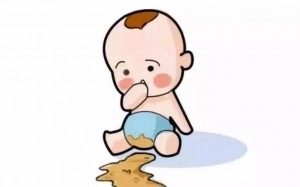Recently, the number of children with diarrhea in pediatrics of some hospitals has increased significantly. Although diarrhea is a common disease in children, if you neglect nursing or delay treatment, it may cause serious dehydration of infants and young children, which may lead to life-threatening. Under what circumstances should the baby with diarrhea be sent to the doctor, how to suit the remedy to the case, and how to care scientifically? Let’s look down.
Take your baby to the hospital in these cases?
Treasure mothers need to know the baby’s normal defecation habits before they can judge whether the baby has diarrhea at the first time. During diarrhea, the baby’s stool frequency obviously exceeds the normal frequency, and the feces are thin and the water content increases. At this time, don’t worry about taking medicine for your baby. You can observe it. Perhaps you can reduce the amount of supplementary food or stop adding supplementary food. After pulling it once or twice, it will get better quickly. If the baby’s stool reaches 5-10 times or more, he needs to seek medical attention in time.
In addition, pay attention to observe the changes of the disease. Severe dehydration of infants may lead to life-threatening. Parents need to observe the mental state of their children. Some children are depressed when they are dehydrated, and do not like to talk or move. Some children are irritable and keep crying. Look at the elasticity of the skin and the mucous membrane of the lips. If the elasticity of the skin and mucous membrane becomes poor and dry, it indicates dehydration. Urine volume is an important sensitive indicator to observe whether the baby’s urine volume is less than usual. Some babies will also have eye socket depression, fontanel depression, etc. if the baby has these conditions, it indicates that the dehydration is serious, it is necessary to seek medical attention in time.

These are the common drugs for diarrhea
The baby’s diarrhea may be caused by bacteria and virus infection, or it may be caused by non infectious factors such as improper feeding and food allergy. Therefore, do not use antibiotics indiscriminately before the cause is clear.
It is important to master the use of commonly used drugs to treat diarrhea. The commonly used medicine to treat diarrhea is montmorillonite powder, which is a protective agent for gastrointestinal mucosa and should be taken between meals. The drugs for regulating the intestinal flora include Bacillus subtilis dual live bacteria granules, Bacillus licheniformis live bacteria capsules, etc. the water temperature should be controlled below 40 ° C when taking.
Another commonly used drug is oral rehydration salts. Children can’t eat salt before they are one year old. Can oral rehydration salt be used? In fact, in addition to losing water, the baby also loses a large amount of sodium, potassium, chlorine and other electrolytes. Oral rehydration salts timely replenish the lost water and electrolytes. When the child is thirsty, it is very necessary for the treatment of diarrhea. Oral rehydration salts should be prepared in strict accordance with the doctor’s instructions.
Scientific nursing makes the baby better faster
Although the causes of diarrhea are different and there are different treatment methods, the nursing is basically the same. Diarrhea is not terrible. Scientific nursing is the key.
On the one hand, adjust the diet to maintain the supply of water and nutrition. Breastfeeding babies can continue to feed and stop adding supplementary food. Older children can eat rice soup, porridge, noodles, etc. when they have diarrhea, and avoid the intake of high sugar, high protein and high-fat foods. If the baby has vomiting at the same time of diarrhea, he can temporarily fast for 4-6 hours, but he can not help drinking. After the condition improves, he can continue to feed, from less to more, from thin to thick, and gradually recover.
On the other hand, protect the baby’s little ass. The stool contains a lot of alkaline intestinal fluid, which is very irritating to the baby’s skin. Choose cotton diapers with strong water absorption for the baby. After each defecation, the baby should clean the baby’s buttocks with warm water to keep the baby’s buttocks dry. You can also apply some hip protection creams, such as Vaseline ointment and zinc oxide oil.
Post time: Aug-31-2022




